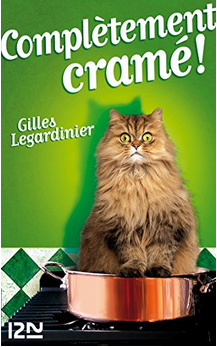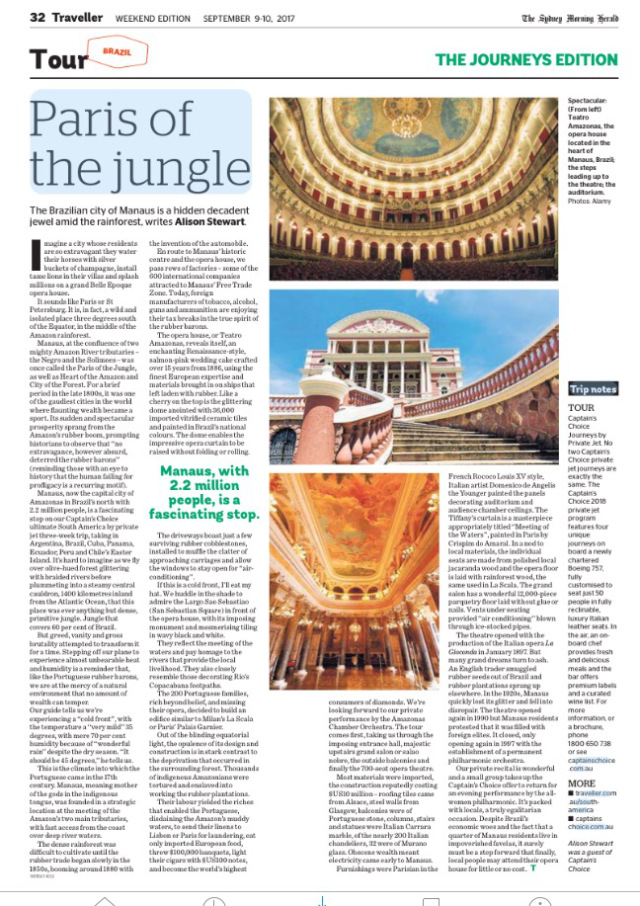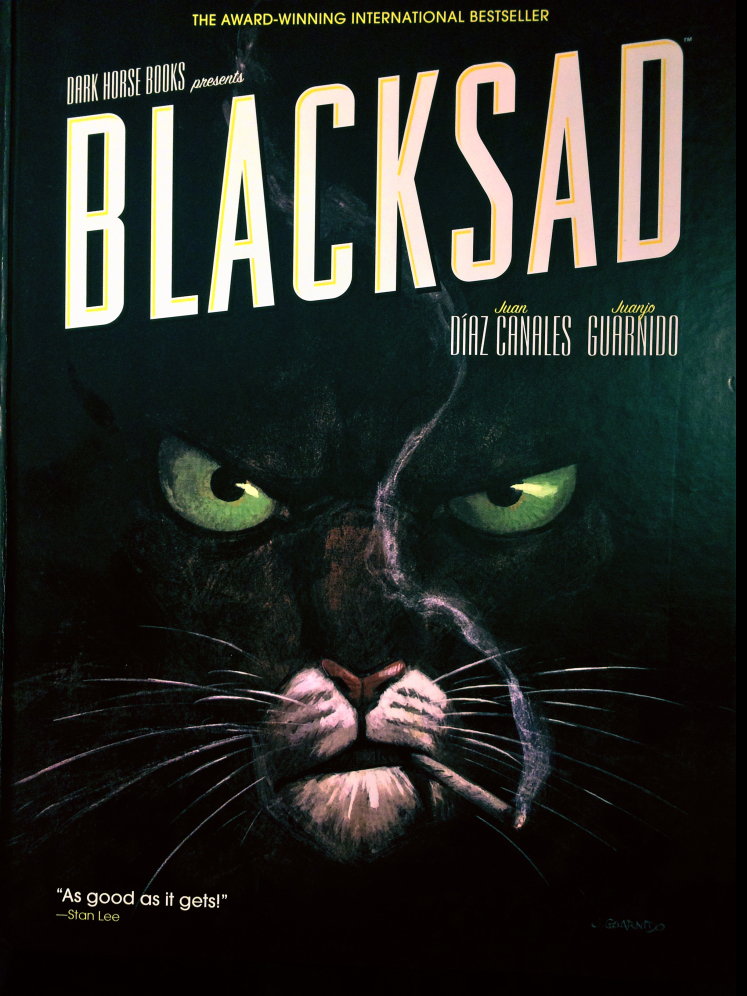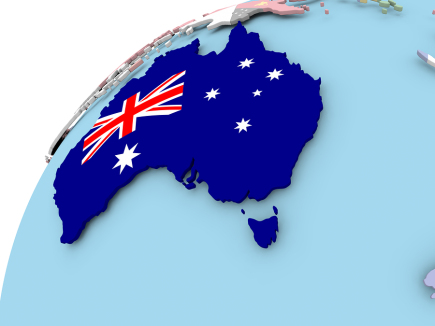
In just a few days, Amy Smith will leave Edmonton’s winter behind for the near perfect climate of Australia’s Gold Coast, but it’s not the surfing that is drawing her to Brisbane.
She is going to Australia to begin a two-year program at the University of Queensland, which will lead to a masters of development practices. The opportunity to continue her studies was made possible by a Rotary Global Grant Scholarship.
These scholarships are an example of how contributions to The Rotary Foundation support Rotary’s efforts to achieve peace and world understanding.
“Without this support from Rotary, I would have been unable to continue my studies,” says Amy, who already has a bachelor of arts in political science and native studies and a certificate in Aboriginal governance and partnerships from the University of Alberta.
As a result of her studies, Amy expects to learn, “practical skills to do international development projects. The program will give me tools to work with communities and analyze their needs.”
Amy has a long history of service, beginning in 2009 when she was one of a group of Calmar (Alberta) high school students who went to Belize. When they returned, their principal—himself a Rotarian—encouraged the students to form an Interact club. Amy was the founding president.
Since then, “Rotary has just been such a big part of my life,” Amy says. “I wouldn’t be where I am without Rotary. They believed in me.”
While a university student, Amy joined the University of Alberta Rotaract club, serving as its president during her final year. After graduation, she joined the Rotaract club of Edmonton.
As an Interactor and Rotaractor, Amy attended several District conferences and the 2010 RI Convention in Montreal, participated in a Rotary fellowship exchange to India and Adventures in Citizenship in Ottawa, and participated in and helped organize service projects to India, Belize and Costa Rica.
Last month, Amy helped organize and co-facilitated an Indigenous Awareness Session for Rotarians.
Scholarships supported by donations to The Rotary Foundation
Dean Wood (RC of Edmonton Riverview), who chairs the scholarship subcommittee of the District’s Foundation Committee, emphasizes that the Global Grant Scholarship is one way in which Rotary works towards achieving its fourth object: “The advancement of international understanding, goodwill and peace.”
Information about Global Grant and District Grant Scholarships is available on the District website.
“The fundamental goal of the Global Grant Scholarships is to develop a core of people who will have capacity to provide leadership in peace and understanding,” Dean says.
“Over the years, there have been a substantial number of people who have been able to continue their studies as a result of receiving Global Grant Scholarships,” Dean says. “Each has develop of people around the world who are committed to the values of Rotary.”
There are three sources of funds for Global Grant Scholarships, the largest of which is the Rotary Foundation.
“These scholarships demonstrate the value of the contributions of individual Rotarians to the Foundation,” Dean says. “The dollars they contribute lead to these young people having these great opportunities to further the goals of Rotary.”
Other money for Amy’s scholarship came from the Nisku-Leduc Rotary clubs (the sponsor Rotary clubs) and several partner clubs (Edmonton Riverview, Westlock, Edmonton Whyte Avenue, St. Albert Saint City, Jasper and Brisbane High-Rise in Australia). The money contributed by individual clubs was then matched by the District.
Previous Global Grant Scholar learned about plight of those escaping danger and trauma
While several clubs supported Amy’s scholarship, the Rotary Club of Whitecourt was the only club to help fund a previous Global Grant Scholarship, which enabled Meghan Casey to continue her studies after graduating from the University of Victoria.
Meghan, who grew up in Whitecourt, studied at the University of Kent’s Brussels School for International Studies from 2015 to 2017. The focus of her master’s program was human right’s laws and international migration.
In an article published in Beyond Borders, the newsletter for Zones 24 and 32, Meghan wrote that during her studies she became interested in the plight of “vulnerable people [who] are forced from their homes and subjected to extreme danger and trauma in hopes of finding security.”
Both in the article and in a presentation she made during the District Conference held in
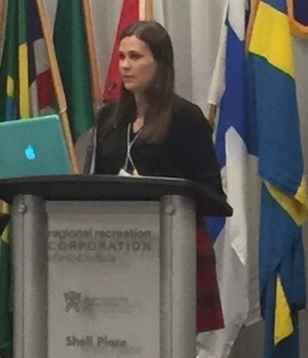
Former Global Grant Scholar Meghan Casey speaks at the District 5370 Conference in Fort McMurray in September 2017
Fort McMurray in September, Meghan described spending several weeks in the fall of 2016 as a volunteer in the unofficial refugee camp in northern France known as “The Jungle,” that sprang up in 2015 during the European migrant crisis.
“At the time, it hosted some 10,000 people, many of whom were unaccompanied minors. Camp conditions were horrific. People lived in flimsy tents pitched in an old asbestos dumping site,” Meghan wrote.
“The French government refused to provide aid, and the organizations operating in the area struggled to provide for the growing population. In November, the French government executed an uncoordinated attempt to dismantle the camp. Some 1,000 children went missing, many of whom are suspected to have fallen in with human traffickers.”
Based on her volunteer experience in The Jungle, Meghan decided to approach her studies from a different angle when she returned to Brussels for the final year of her master’s program.
“I wanted to address the increasing gap between official policies on paper and what actually happens on the ground,” she wrote. “I researched the implications of a particular EU policy for migrants and asylum seekers transiting through Turkey to the Greek islands. I spoke with Greek lawyers and other volunteers operating in the camps to assess how the agreement with Turkey had been implemented.”
While writing her thesis, Meghan worked as a trainee at the European Parliament.
“Contributing to the legislative process was fulfilling, because it allowed me to put into practice the theoretical knowledge I had acquired during my studies. I was learning about the decision-making process from the top-down. I had seen how certain policies affected vulnerable populations, and now I was learning what factors influenced those decisions.”
Meghan appreciates the support she received from the Rotary Clubs of Whitecourt and Houthalen Midden-Limburg in Belgium, the District 5370 Foundation Committee and The Rotary Foundation, which allowed her to complete her studies.
“I have been able to challenge my own understanding of global human movement by attending various courses, training sessions and conferences. Learning from experts in the field, including NGO personnel and academics, was an incredible experience that allowed me to re-conceptualize how I view the topic of migration in Europe and North America. Rotary’s support has allowed me to advocate for a more positive portrayal of migrants in politics and the media, which ultimately affects how they are welcomed in their new communities.
“Without the support of my community, local and district Rotary clubs, I would not have had the opportunity to engage in so many diverse and challenging opportunities, which have ultimately shaped me into the person I am today and will be in the future. Thank you, Rotary Foundation!”
You can help provide opportunities for other young people to further their studies related to peace and understanding with the support of Global Grant Scholarships when you donate to The Rotary Foundation.
Advertisements Share this:
